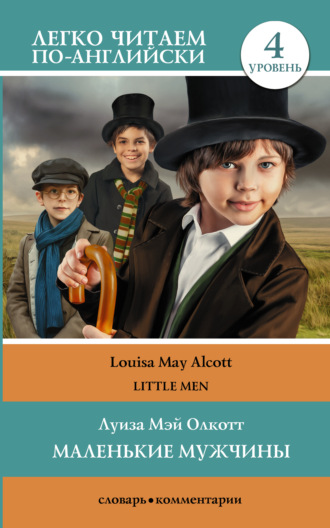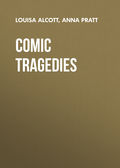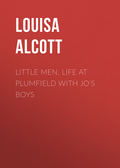
Луиза Мэй Олкотт
Маленькие мужчины / Little men. Уровень 4
© С. А. Матвеев, адаптация текста, коммент. и словарь
© ООО «Издательство АСТ», 2022
Louisa May Alcott
Little Men
Nat
“Please, sir, is this Plumfield?” asked a ragged boy of the man who opened the gate.
“Yes. Who sent you?”
“Mr. Laurence. I have got a letter for the lady.”
“All right; go up to the house, and give it to her, little chap.”
The man spoke pleasantly, and the boy went on, feeling much cheered by the words. Nat saw a large square house before him, with an old-fashioned porch, wide steps, and lights shining in many windows. Then he heard young voices.
A rosy-faced servant-maid opened the door, and smiled as she took the letter which he silently offered. She pointed to a seat in the hall, and said, with a nod:
“Sit there.”
The house was full of boys. There were boys everywhere, upstairs and downstairs; big boys, little boys, and middle-sized boys. Two large rooms on the right were evidently schoolrooms. An open fire burned on the hearth, and several indolent lads lay on their backs before it. A tall boy was practising on the flute in one corner. Two or three others were jumping over the desks.
In the room on the left a long supper-table was seen, with great pitchers of new milk, piles of brown and white bread. A flavor of toast was in the air, also suggestions of baked apples.
The hall, however, was the most inviting prospect of all. One landing was devoted to marbles, the other to checkers, while the stairs were occupied by a boy reading, a girl singing a lullaby to her doll, two puppies, and a kitten.
One very lively boy came down so swiftly that he could not stop himself and fell off the banisters, with a crash. Nat ran up to the fallen rider. The boy, however, only winked rapidly and said, “Hello!”
“Hello!” returned Nat.
“What’s your name?”
“Nat Blake.”
“Mine’s Tommy Bangs. Demi, here’s a new one. Come here.”
At his call, the boy reading on the stairs looked up with a pair of big brown eyes, and after an instant’s pause, he put the book under his arm, and came soberly down to greet the newcomer.
“Have you seen Aunt Jo?” he asked.
“I haven’t seen anybody yet but you boys; I’m waiting,” answered Nat.
“Did Uncle Laurie send you?” proceeded Demi, politely, but gravely.
“Mr. Laurence did.”
“He is Uncle Laurie; and he always sends nice boys.”
Nat smiled. He did not know what to say next. A little girl came up with her doll in her arms. “This is my sister, Daisy,” announced Demi.
The children nodded to one another; and the little girl’s face dimpled with pleasure, as she said affably:
“I hope you’ll stay. We have such good times here; don’t we, Demi?”
“Of course, we do.”
“It seems a very nice place indeed,” observed Nat.
“It’s the nicest place in the world, isn’t it, Demi?” said Daisy.
“No, I think Greenland, where the icebergs and seals are, is more interesting. But I’m fond of Plumfield, and it is a very nice place as well,” said Demi.
The servant returned and said,
“All right; you will stay here.”
“I’m glad; now come to Aunt Jo,” Daisy took him by the hand.
Demi returned to his beloved book, while his sister led the newcomer into a back room, where a stout gentleman was frolicking with two little boys on the sofa, and a thin lady was just finishing the letter.
“Here he is, aunty!” cried Daisy.
“So this is my new boy? I am glad to see you, my dear, and hope you’ll be happy here,” said the lady.
She was not at all handsome, but she was merry. She saw the little tremble of Nat’s lips as she smoothed his hair, and her keen eyes grew softer.
“I am Mother Bhaer, that gentleman is Father Bhaer, and these are the two little Bhaers. Come here, boys, and see Nat.”
The stout man, with a chubby child on each shoulder, came up to welcome the new boy. Rob and Teddy merely grinned at him, but Mr. Bhaer said, in a cordial voice:
“There is a place for you, my son; sit down and dry thy wet feet.”
Mrs. Bhaer gave him warm slippers. He said “Thank you, ma’am”; and said it so gratefully that Mrs. Bhaer’s eyes grew soft, and she said something merry.
“There are Tommy Bangs’ slippers; but he never will remember to put them on in the house; so he won’t have them. They are too big; but that’s better; you can’t run away from us fast.”
“I don’t want to run away, ma’am.”
“That’s good! Now I am going to warm you, and try to get rid of that ugly cough. How long have you had it, dear?” asked Mrs. Bhaer.
“All winter. I got cold.”
“No wonder. He were living in that damp cellar on a rag!” said Mrs. Bhaer, in a low tone[1] to her husband, who was looking at the boy.
“Robin, go to Nursey, and tell her to give you the medicine and the liniment,” said Mr. Bhaer.
Nat looked a little anxious at the preparations, but forgot his fears in a hearty laugh, when Mrs. Bhaer whispered to him, with a droll look:
“The syrup I’m going to give you has honey in it; and Ted wants some.”
A bell rang, and a loud tramping through the hall announced supper. Bashful Nat quaked at the thought of meeting many boys, but Mrs. Bhaer held out her hand to him, and Rob said, patronizingly,
“Don’t be afraid; I’ll take care of you.”
Twelve boys, six on a side[2], stood behind their chairs, while the tall flute-playing boy was trying to curb their ardor. But no one sat down till Mrs. Bhaer was in her place behind the teapot, with Teddy on her left, and Nat on her right.
“This is our new boy, Nat Blake.”
As she spoke everyone stared at Nat. The boys did their best to obey. But there are times when hungry boys cannot be repressed without real cruelty, and Saturday evening, after a half-holiday, was one of those times.
“Let them have one day in which they can howl and racket and frolic. A holiday isn’t a holiday without plenty of freedom and fun,” Mrs. Bhaer used to say.
Nat sat with Tommy Bangs and Mrs. Bhaer.
“Who is that boy next the girl down at the other end?” whispered Nat to his young neighbor.
“That’s Demi Brooke. Mr. Bhaer is his uncle. He knows much and reads a lot.”
“Who is the fat one next him?”
“Oh, that’s Stuffy Cole. His name is George, but we call him Stuffy because he eats so much. The little fellow next Father Bhaer is his boy Rob, and then there’s big Franz his nephew; he teaches something.”
“He plays the flute, doesn’t he?” asked Nat.
Tommy nodded, and said,
“Yes. And we dance sometimes, and do gymnastics to music[3]. I like a drum myself, and want to learn as soon as I can.”
“I like a fiddle best; I can play one too,” said Nat.
“Can you?” and Tommy. “Mr. Bhaer’s got an old fiddle, and he’ll let you play on it if you want to.”
“Oh, I would like it ever so much. You see, I used to go round fiddling with my father, and another man, till he died.”
“Wasn’t that fun?” cried Tommy, much impressed.
“No, it was horrid; so cold in winter, and hot in summer. And I got tired; and they were cross sometimes; and I didn’t get enough to eat. But I loved my little fiddle, and I miss it. Nicolo took it away when father died.”
“You’ll belong to the band[4] if you play good.”
“Do you have a band here?” Nat’s eyes sparkled.
“Yes we do; a jolly band, all boys; and they have concerts. You just see what happens tomorrow night.”
After this pleasantly exciting remark, Tommy returned to his supper.
Mrs. Bhaer heard all they said. She put roly-poly[5] Nat next to Tommy, because she wanted to get the key to the new boy’s character. In the letter which Mr. Laurence had sent with Nat, he had said:
“Dear Jo, this poor lad is an orphan now, sick and friendless. He has been a street-musician; and
I found him in a cellar, mourning for his dead father, and his lost violin. I think there is something in him. You will cure his body, Fritz will help his mind, and when he is ready I’ll see if he is a genius or only a boy with a talent which may earn his bread for him,
Teddy.”
“Of course we will!” cried Mrs. Bhaer, as she read the letter.
When she saw Nat she felt at once that here was a lonely, sick boy who needed just what she loved to give, a home and motherly care. Both she and Mr. Bhaer observed him quietly; and in spite of ragged clothes, awkward manners, and a dirty face, they saw much about Nat that pleased them. He was a thin, pale boy, of twelve, with blue eyes, and a good forehead under the rough, neglected hair; an anxious, scared face and a sensitive mouth that trembled when a kind glance fell on him.
“He will fiddle all day long if he likes,” said Mrs. Bhaer to herself, as she saw the eager, happy expression on his face when Tommy talked of the band.
So, after supper, Mrs. Jo appeared with a violin in her hand, and went to Nat, who sat in a corner.
“Now, my lad, we want a violin in our band, and I think you will do it nicely.”
He seized the old fiddle at once, and handled it with care. Music was his passion.
“I’ll do the best I can, ma’am,” was all he said; and then drew the bow across the strings.
There was a great clatter in the room. Nat played softly to himself, forgetting everything in his delight. It was only a simple melody, such as street-musicians play, but it caught the ears of the boys at once, and silenced them. They stood listening with surprise and pleasure. Gradually they got nearer and nearer, and Mr. Bhaer came up to watch the boy. Nat’s eyes shone, his cheeks reddened, and his thin fingers flew.
A hearty round of applause rewarded him, when he stopped.
“You do that very well,” cried Tommy, who considered Nat his protege.
“You will be the first fiddle in my band,” added Franz, with an approving smile.
Mrs. Bhaer whispered to her husband:
“Teddy is right: there’s something in the child.”
Mr. Bhaer nodded his head emphatically, as he clapped Nat on the shoulder, saying, heartily:
“You play well, my son. Come now and play something which we can sing.”
It was the proudest, happiest minute of the poor boy’s life when he was led to the place by the piano, and the lads gathered round. They chose a song he knew; and soon violin, flute, and piano led a chorus of boyish voices. It was too much for Nat. As the final shout died away, he dropped the fiddle, and turning to the wall sobbed like a little child.
“My dear, what is it?” asked Mrs. Bhaer, who was singing.
“You are all so kind and it’s so beautiful,” sobbed Nat, coughing till he was breathless.
“Come with me, dear; you must go to bed and rest. This is too noisy a place for you,” whispered Mrs. Bhaer; and took him away to her own parlor.
Then she asked him to tell her all his troubles, and listened to the little story with tears in her eyes.
“My child, you have got a father and a mother now, and this is home. Don’t think of those sad times any more, but get well and happy. This place is made for all sorts of boys to have a good time in, and to learn how to be useful men, I hope. You will have as much music as you want. Now have a bath, and then go to bed.”
Mrs. Bhaer led him up to a big room, where they found a stout German woman with a round and cheery face.
“This is Nursey Hummel, and she will give you a nice bath, and cut your hair. That’s the bathroom in there.”
By the time Nat was washed and done up in a blanket by the fire, while Nursey cut his hair, a new detachment of boys arrived.
Nursey gave Nat a flannel night-gown, and then tucked him into one of the three little beds standing in the room. Cleanliness in itself was a new and delightful sensation; flannel gowns were unknown comforts in his world; and the feeling that somebody cared for him made that room a sort of heaven to the homeless child.
A momentary lull was followed by the sudden appearance of pillows flying in all directions. The battle raged in several rooms, all down the upper hall, and even in the nursery. No one forbade it, or even looked surprised.
“Won’t they hurt them?” asked Nat.
“Oh dear, no! We always allow one pillow-fight Saturday night. I like it myself,” said Mrs. Bhaer.
“What a nice school this is!” observed Nat, in a burst of admiration.
“It’s an odd one,” laughed Mrs. Bhaer, “but you see we don’t want to make children miserable by too many rules, and too much study. I forbade night-gown parties at first; but it was of no use. So I made an agreement with them. I allow a fifteen-minute pillow-fight every Saturday night; and they promise to go properly to bed every other night. I tried it, and it worked well. If they don’t keep their word, no frolic. I let them rampage as much as they like.”
“It’s a beautiful plan,” said Nat.
Mrs. Bhaer looked at her watch, and called out:
“Time is up, boys. Into bed, or pay the forfeit!”
“What is the forfeit?” asked Nat.
“Lose their fun next time,” answered Mrs. Bhaer. “I give them five minutes to settle down, then put out the lights, and expect order. They are honorable lads, and they keep their word.”
Sunday
Nat flew out of bed, and dressed himself with great satisfaction in the suit of clothes he found on the chair. Suddenly Tommy appeared and escorted Nat down to breakfast.
The sun was shining into the dining-room on the well-spread table, and the flock of hungry, hearty lads who gathered round it. Everyone stood silently behind his chair while little Rob, standing beside his father at the head of the table, folded his hands, reverently bent his curly head, and softly repeated a prayer. Then they all sat down to enjoy the Sunday-morning breakfast. There was much pleasant talk while the knives and forks rattled briskly.
“Now, my lads, be ready for church when the bus comes round,” said Father Bhaer.
Everyone had some little daily duty, and was expected to perform it faithfully. Some brought wood and water, brushed the steps, or ran errands for Mrs. Bhaer. Others fed the pet animals, and did chores about the barn with Franz. Daisy washed the cups, and Demi wiped them, for the twins liked to work together. Even Baby Teddy trotted to and fro, putting napkins away, and pushing chairs into their places. For half and hour the lads buzzed about like a hive of bees. Then the bus drove round, Father Bhaer and Franz with the eight older boys piled in, and away they went for a three-mile drive to church in town.
Because of the troublesome cough Nat preferred to stay at home with the four small boys, and spent a happy morning in Mrs. Bhaer’s room, listening to the stories she read them, and learning the hymns she taught them.
“This is my Sunday study,” she said, showing him shelves filled with picture-books, paint-boxes, little diaries, and materials for letter-writing. “I want my boys to love Sunday, to find it a peaceful, pleasant day, when they can rest from common study and play, yet enjoy quiet pleasures, and learn lessons more important than any taught in school. Do you understand me?” she asked, watching Nat’s attentive face.
“You mean to be good?” he said, after hesitating a minute.
“Yes; to be good, and to love to be good. It is hard work sometimes, I know very well; but we all help one another.”
She took down a thick book and opened at a page on which there was one word at the top.
“Why, that’s my name!” cried Nat, looking both surprised and interested.
“Yes; I have a page for each boy. I keep a little account of how he gets on through the week, and Sunday night I show him the record. If it is bad I am sorry and disappointed, if it is good I am glad and proud; but, whichever it is, the boys know I want to help them, and they try to do their best for love of me and Father Bhaer. I don’t show my records to any but the one to whom each belongs. I call this my conscience book[6]; and only you and I will ever know what is written on the page below your name. Whether you will be pleased or ashamed to read it next Sunday depends on yourself. I think it will be a good report. I hope you will be quite contented if you keep our few rules, live happily with the boys, and learn something.”
“I’ll try ma’am,” said Nat.
“I really don’t know which I like best, writing or boys,” she said, laughing. “Yes, I know many people think boys are a nuisance, but that is because they don’t understand them.”
Nat, who had never heard anything like this before, really did not know whether Mother Bhaer was a trifle crazy, or the most delightful woman he had ever met.
“Now, I think you will go into the school-room and practise some of the hymns we will sing tonight,” she said.
When the church-goers came back and dinner was over, every one read, wrote letters home, or talked quietly to one another, sitting here and there about the house. At three o’clock the entire family went to walk. Nat was not strong enough for the long walk, and asked to stay at home with Tommy, who kindly offered to show him Plumfield.
“You’ve seen the house, so come out and have a look at the garden, and the barn, and the menagerie,” said Tommy.
“What is your menagerie?” asked Nat, as they trotted along the road that encircled the house.
“We all have pets, you see, and we keep them in the corn-barn, and call it the menagerie. Here you are. Isn’t my guinea-pig[7] a beauty?” and Tommy proudly presented one of the ugliest animal that Nat ever saw.
“Those white mice are Rob’s, Franz gave them to him. The rabbits are Ned’s, and the bantams outside are Stuffy’s. That box is Demi’s turtle-tank.”
“What is in this box?” asked Nat, stopping before a large deep one, half-full of earth.
“Oh, that’s Jack Ford’s worm-shop[8]. He digs heaps of them and keeps them here, and when we want to go fishing with, we buy some of him. It saves lots of trouble, only he charged too much for them. Now, I own two hens, those gray ones with top knots, and I sell Mrs. Bhaer the eggs, but I never ask her more than twenty-five cents a dozen, never!” cried Tommy.
“Who owns the dogs?” asked Nat.
“The big dog is Emil’s. His name is Christopher Columbus,” answered Tommy. “The white pup is Rob’s, and the yellow one is Teddy’s. A man was going to drown them in our pond, and Papa Bhaer didn’t let him. Their names are Castor and Pollux.”
Nat climbed up a ladder, put his head through a trap door and looked at the pretty doves.
“How do you get these animals?” he asked, when he joined Tommy in the barn.
“We find them or buy them, or folks give them to us. My father sends me mine,” said Tommy, with the air of a millionaire.
Nat sighed, for he had neither father nor money, nothing in the wide world but an old empty pocketbook. Tommy understood the sigh which followed his answer,
“Look here, I’ll tell you what I’ll do. If you hunt eggs for me – I hate it – I’ll give you one egg out of every dozen. When you have twelve, Mother Bhaer will give you twenty-five cents for them, and then you can buy what you like.”
“I’ll do it! What a kind fellow you are, Tommy!” cried Nat, quite dazzled by this brilliant offer.
“Pooh! You begin now and rummage the barn, and I’ll wait here for you. Granny is cackling, so you’re find one somewhere,” and Tommy threw himself down on the hay.
Nat joyfully began his search, and he found two fine eggs.
“You may have one and I’ll have the other, and tomorrow we’ll start again. Here, you chalk your accounts up near mine,” said Tommy.
Then Tommy took Nat to an old willow-tree. From the fence it was an easy scramble into a wide niche between the three big branches. Here little seats had been fixed,
“This is Demi’s and my private place; we made it, and nobody can come up unless we let them, except Daisy,” said Tommy.
“Oh, it’s just beautiful!” cried Nat. “I hope you’ll let me up sometimes. I never saw such a nice place in all my life. I’d like to be a bird, and live here always.”
“It is pretty nice. You can come if Demi doesn’t mind, and I guess he won’t, because he said last night that he liked you.”
“Did he?” and Nat smiled with pleasure.
“Yes; Demi likes quiet boys. And you can read books together.”
“I can’t read very well; I never had any time, you know.”
Punishment
Nat was very fond of Mrs. Bhaer, but found something even more attractive in the good professor, who took fatherly care of the shy feeble boy. Father Bhaer took pleasure in fostering poor Nat’s virtues, and in curing his faults, finding his new pupil as docile and affectionate as a girl. He often called Nat his “daughter” when speaking of him to Mrs. Jo.
One fault of Nat’s gave the Bhaers much anxiety. Nat sometimes told lies[9]. A lie is a lie, it is not right, and everybody knows it.
“Watch your tongue, and eyes, and hands, for it is easy to tell, and look, and act untruth,” said Mr. Bhaer to Nat one day.
“I know it. I used to tell lies because I was afraid of father and Nicolo, and now I do sometimes because the boys laugh at me. I know it’s bad, but I forget,” Nat looked much depressed by his sins.
“When I was a little lad I used to tell lies! Ach! But my old grandmother cured me of it. How? My parents cried, and punished, but still did I forget as you. Then said the dear old grandmother, ‘I shall help you to remember’. With that she drew out my tongue and snipped the end with her scissors till the blood ran. That was terrible, you may believe, but it did me much good, because it was sore for days, and every word I said came so slowly that I had time to think. After that I was more careful, for I feared the big scissors.”
“I never had any grandmothers, but if you think it will cure me, I’ll let you snip my tongue,” said Nat, heroically, for he dreaded pain.
Mr. Bhaer smiled, but shook his head.
“I have a better way than that, I tried it once before and it worked well. See now, when you tell a lie I will not punish you, but you will punish me.”
“How?” asked Nat.
“You will ferule me in the good old-fashioned way; I seldom do it myself, but it may make you remember better to give me pain than to feel it yourself.”
“Strike you? Oh, I can’t!” cried Nat.
“Then watch your tongue. I have no wish to be hurt, but I will gladly bear much pain to cure this fault.”
This suggestion made such an impression on Nat, that for a long time he watched upon his lips, and was desperately accurate. But alas! One sad day, when Emil threatened to thrash him, if it was he who had run over his garden and broken down his best hills of corn, Nat declared he didn’t, and then was ashamed to own up that he did do it, when Jack was chasing him the night before.
He thought no one saw it, but Tommy happened to see him, and when Emil spoke of it a day or two later, Tommy gave his evidence, and Mr. Bhaer heard it. School was over, and Mr. Bhaer took Nat by the hand and led him into the school and shut the door.
“You remember what I told you last time?” said Mr. Bhaer, sorrowfully, not angrily.
“Yes; but please don’t make me beat you,” cried Nat, with both hands behind him, and a face full of distress.
“I shall keep my word, and you must remember to tell the truth. Obey me, Nat, take this and give me six good strokes.”
Nat took the rule, for when Mr. Bhaer spoke in that tone everyone obeyed him. The boy gave two feeble blows on the broad hand held out to him. Then he stopped and looked up half-blind with tears, but Mr. Bhaer said steadily:
“Go on, and strike harder.”
Nat drew his sleeve across his eyes and gave two more quick hard strokes that reddened the hand, yet hurt the giver more.
“Isn’t that enough?” he asked.
“Two more,” was all the answer, and he gave them, then threw the rule all across the room, and hugging the kind hand in both his own, laid his face down:
“I will remember! Oh! I will!”
Then Mr. Bhaer put an arm about him[10], and said in a compassionate tone:
“I think you will. Ask the dear God to help you.”
Tommy saw it through the window. He said no more, for he crept back to the hall, looking so excited that the boys crowded round him to ask him about Nat. In a most impressive whisper Tommy told them.
“He made me do the same thing once,” said Emil.
“And you hit him? dear old Father Bhaer?”
“It was so long ago.”
Nat did not come to dinner, but Mrs. Jo took some up to him, and said a tender word, though he could not look at her. He opened door to slip away into the woods. The walk did Nat good, and he came home quieter than usual.
No one said a word about the scene of the morning, but its effect was lasting. Nat tried his very best, and found much help from the earnest little prayers he prayed to his Friend in heaven.






